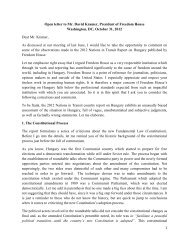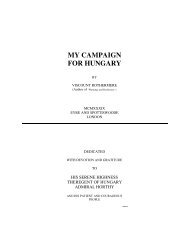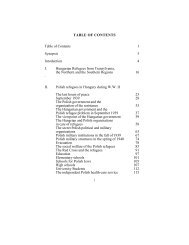The Fate of Western Hungary 1918-1921 - Corvinus Library ...
The Fate of Western Hungary 1918-1921 - Corvinus Library ...
The Fate of Western Hungary 1918-1921 - Corvinus Library ...
Create successful ePaper yourself
Turn your PDF publications into a flip-book with our unique Google optimized e-Paper software.
Battalion <strong>of</strong> Kassa, on the northern Italian front.<br />
And thus, we return to the forcible grabbing <strong>of</strong> power on October 31, <strong>1918</strong><br />
by Mihály Károlyi and his ‘circle,’ actually, up to the day <strong>of</strong> his coup d’état,<br />
when Archduke Joseph August, homo regius, 16 named Károlyi as Prime<br />
Minister. On the same day, around 5:30pm, armed soldiers broke into the house<br />
<strong>of</strong> Count István Tisza, former Prime Minister, and killed him. 17 Earlier, one<br />
Otto Korvin (1894-1919), the leader <strong>of</strong> the revolutionary Socialists, personally<br />
prepared an assassination attempt on Count Tisza, carried out by János Lékai<br />
(1895-1925) on October 16. On top <strong>of</strong> all this, due to all the accusations spread<br />
by Károlyi and his circle, the majority <strong>of</strong> public opinion held Tisza responsible<br />
for <strong>Hungary</strong>’s entry into the war. Yet, it was a fact little known by the public<br />
that, after the assassination <strong>of</strong> the heir to the throne, Franz Ferdinand (June 28,<br />
1914), in opposition to the rest <strong>of</strong> the responsible decision makers <strong>of</strong> the<br />
Monarchy, the Hungarian Prime Minister opposed, for long weeks, military<br />
action against Serbia. Tisza only agreed to a declaration <strong>of</strong> war against Serbia<br />
after getting assurances that South Slav territories would not be annexed to the<br />
Monarchy, as that threatened, in his eyes, to unravel the Dualist system.<br />
<strong>The</strong> past decades’ Marxist-Communist historiography missed no<br />
opportunity to trumpet that István Tisza, precisely the day following the<br />
unsuccessful attempt on his life by Lékai, admitted in parliament that the war<br />
was lost. <strong>The</strong> truth is very different, as proven by the Parliamentary Record for<br />
<strong>1918</strong>, unavailable for a long time. What did happen, among other things, in the<br />
parliamentary chamber on the day <strong>of</strong> the attempt on Tisza’s life? On October<br />
16, <strong>1918</strong>, during the 823rd sitting <strong>of</strong> Parliament convened on June 21, 1910<br />
[<strong>The</strong> election <strong>of</strong> 1914 was cancelled due to the outbreak <strong>of</strong> war-ed.], Prime<br />
Minister Sándor Wekerle described the political situation <strong>of</strong> the day, the peace<br />
<strong>of</strong>fer made to President Wilson and the plans to alter Austria’s make-up into a<br />
federative union. In the heated debate, Count Károlyi, too, got the floor and<br />
began with: “Honored House! We have lost the war. Now, it is important for us<br />
not to lose the peace. We have lost the war and the situation today must be<br />
16 Homo regius: the king’s man. <strong>The</strong> ruler’s confidante, charged with handling difficult<br />
situations. King Charles IV named Archduke Joseph August (1872-1962) homo regius<br />
on October 27, <strong>1918</strong>, a position from which neither the democratic civil revolution nor<br />
the revolution <strong>of</strong> the proletariat could displace him. <strong>The</strong> so-called unionist government,<br />
led by Gyula Peidl (1873-1943), was in power from the first day after the fall <strong>of</strong> the<br />
Commune, August 1, 1919, until its removal by a coup on August 6. On that day,<br />
Archduke Joseph announced that he will temporarily assume the role <strong>of</strong> head <strong>of</strong><br />
government as Governor. <strong>The</strong> following day, he named István Friedrich (1883-1951)<br />
and his government <strong>of</strong>ficials. At the request <strong>of</strong> the Entente Powers, who were afraid <strong>of</strong><br />
a return <strong>of</strong> the Habsburgs to the Hungarian throne, he resigned his post on August 26.<br />
17 Szász, Károly: Tisza István. Élet- és jellemrajz [István Tisza. Biography and<br />
character portrait]. Budapest, <strong>1921</strong>; Fogarassy, László: Kik ölték meg gróf Tisza Istvánt<br />
[Who killed Count István Tisza]? In: Történelmi Szemle, 1980, issie 2, pp. 338–341;<br />
Pölöskei, Ferenc: Tisza István [István Tisza]. Budapest, 1985.<br />
12
















